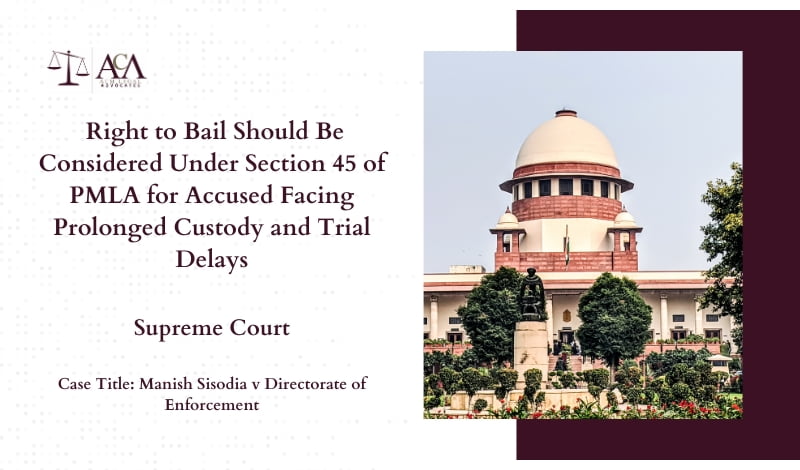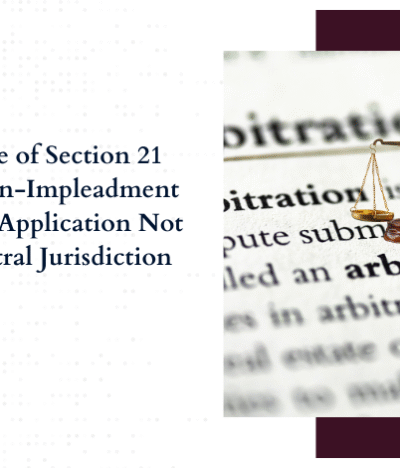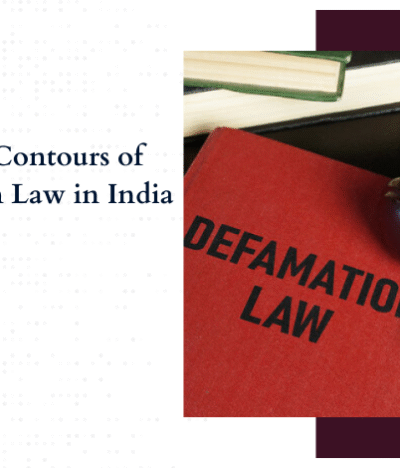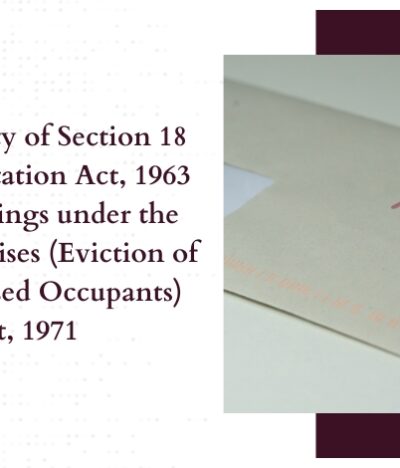In the recent ruling of the Supreme Court of India, while granting bail to former Delhi Deputy Chief Minister Manish Sisodia in the liquor policy case, the Supreme Court recently noted that in instances where there is a delay in trial and the accused has been in custody for an extended period, the right to bail should be interpreted within Section 439 of the CrPC and Section 45 of the Prevention of Money Laundering Act (PMLA). However, this consideration will also depend on the nature of the allegations.
In the ruling delivered by the Division bench comprising of Hon’ble Mr. Justice B.R. Gavai and Hon’ble Mr. K.V. Viswanathan, the court observed and thereon, relaxed the twin conditions of the bail considering the delay and pendency of the trial and not getting concluded within a short time period and long presence of the accused in the custody.
The Court observed that right to speedy trial is an essential and corresponding paramount importance of one’s personal liberty and, therefore, the accused is eligible to get bail if the custody has been for a long span of time.
Background
The case revolves around allegations of corruption, money laundering, and policy manipulation by Manish Sisodia (hereinafter referred as ‘the accused’), the former Deputy Chief Minister of Delhi. The controversy emerged from the Delhi Excise Policy for the year 2021-22, which was introduced by the Delhi government under the leadership of the Aam Aadmi Party (AAP). The policy aimed to reform the liquor business in Delhi, but it soon became the subject of scrutiny and investigation.
On July 20, 2022, Vinai Kumar Saxena, the Lieutenant Governor of Delhi, addressed a letter alleging irregularities in the framing and implementing of the Delhi Excise Policy. The Ministry of Home Affairs directed an inquiry into the matter on July 22, 2022. The allegations suggested that the policy favoured certain private entities in exchange for financial kickbacks.
On February 26, 2023, Manish Sisodia was arrested by the Central Bureau of Investigation (CBI) after an investigation allegedly revealed his involvement in the corruption scandal.
On March 9, 2023, the Directorate of Enforcement (ED) also arrested the former dy. Chief minister, alleging him of laundering money connected to the corrupt activities under the Delhi Excise Policy.
On April 25, 2023, the CBI filed a charge sheet against the accused citing offenses under various provisions of the Prevention of Corruption Act, 1988, along with several offences under the IPC.
The initial bail applications by the accused were rejected by the Hon’ble High Court. Further, the Hon’ble Supreme Court, in a common order dated October 30, 2023, also rejected his bail applications but allowed for observations that might be relevant for future proceedings.
Following the Supreme Court’s decision, the accused filed a second bail application before the trial court on January 27, 2024. While he was initially granted interim protection, the trial court rejected the bail application on April 30, 2024, citing no change in circumstances.
On May 2, 2024, the accused filed a second bail application before the High Court, which was rejected on May 21, 2024.
The Accused, then, approached the Supreme Court by filing Special Leave Petition. The Supreme Court heard the matter on June 4, 2024, and recorded the Solicitor General’s assurance that the investigation would be concluded, and a final charge sheet would be filed by July 3, 2024.
After the final charge sheet was filed, Sisodia approached the Supreme Court once more in July 2024, leading to the issuance of notices and the filing of counter-affidavits by the ED and CBI opposing his appeals.
Issue
The primary legal issue in this case was pertaining to the question of law.
Whether bail should be granted to the accused charged under the Prevention of Corruption Act, 1988, Indian Penal Code, 1860, Prevention of Money Laundering Act, 2002 when a prolonged period of incarceration has been already suffered by the appellant?
Analysis
The Supreme Court granted bail to Manish Sisodia, Delhi’s former deputy Chief Minister, on August 9, 2024. Sisodia was arrested on February 26, 2023, by the Central Bureau of Investigation (CBI) and then subsequently by the Enforcement Directorate (ED) on March 9, 2023. He has been in jail for almost a year-and-a-half without being convicted of any offense and was still awaiting trial. The Supreme Court was hearing the appeal against an order passed by the Delhi High Court in May 2024 denying him bail.
This judgment is notable for three reasons, namely:
- It reaffirms and reminds all courts in the country of the age-old principle that bail is the norm and jail is the exception.
- the right to speedy trial must be respected and keeping an accused behind bars for an unlimited period of time while awaiting trial violates his or her right to life under Article 21 of the Constitution.
- Finally, the right to bail in cases of delay coupled with incarceration for a long period should be read into the bail provisions of the Code of Criminal Procedure, 1972 (CrPC) and the Prevention of Money Laundering Act, 2002 (PMLA).
The Contentions made by the Prosecution mainly deals with:
- Severity of the Charges – The ED and CBI argued that the charges against Sisodia were serious, involving large-scale corruption and sophisticated money laundering schemes. They contended that the manipulation of public policy for personal gain warranted stringent action.
- Tampering with Evidence – The prosecution expressed concerns that if granted bail, Sisodia could potentially tamper with evidence or influence witnesses due to his political influence.
The Contentions made by the Defence mainly deal with:
- Political Motivation – The defence argued that the charges against Sisodia were politically motivated, designed to tarnish his image and that of his political party. They contended that the case was part of a broader pattern of using central investigative agencies for political ends.
- Lack of Substantive Evidence – The defence questioned the substantive nature of the evidence, arguing that there was no direct proof linking Sisodia to the alleged offenses. They also highlighted the prolonged nature of the pre-trial detention without substantial progress in the trial.
- Right to Bail – Citing principles of natural justice and human rights, the defence emphasized that bail is the rule and jail is the exception, particularly when the trial is likely to be prolonged.
The issue before the Supreme Court of India majorly revolves around whether bail should be granted to the accused charged under the Prevention of Corruption Act, 1988, Indian Penal Code, 1860, Prevention of Money Laundering Act, 2002 when a prolonged period of incarceration has been already suffered by the appellant.
The Supreme Court had considered all the relevant facts and led to a clear conclusion in granting bail.
The court, while granting bail, likely considered the length of time Sisodia had already spent in custody, the evidence presented thus far, and the principles established in previous landmark cases regarding bail.
In the case of P. Chidambaram v. Directorate of Enforcement (2019), similar allegations of corruption and money laundering were made against a high-profile political figure. The Supreme Court’s ruling highlighted the need for balancing the rights of the accused with the requirements of justice, especially in cases involving political personalities.
In the case of State of Rajasthan v. Balchand (1977), the principle was established that bail is the norm, and jail is the exception, emphasizing the importance of personal liberty and Right to live freely under Article 21 of the Constitution of India.
Additionally, In the case of Sanjay Chandra v. CBI (2011), the Supreme Court granted bail in a high-profile corruption case, emphasizing that pre-trial detention should not be punitive and that the right to a fair trial includes the presumption of innocence until proven guilty.
Furthermore, in the present case, the court has also considered the progress of the trial and the fact that the investigation was nearing completion with the filing of the final charge sheet, reducing the risk of evidence tampering. In addition, the court also contends that the case largely depends on documentary evidence which is already seized by the prosecution. Therefore, there is no possibility of tampering with the evidence.
The court’s decision to grant bail likely reflected a balance between the severity of the allegations and the principles of justice. While acknowledging the seriousness of the charges, the court has considered the length of pre-trial detention, the stage of the investigation, and the evidence presented.
Conclusion
The decision to grant bail to Manish Sisodia in the case brought by the Directorate of Enforcement underscores the judiciary’s commitment to upholding the principles of personal liberty, the presumption of innocence, and the right to a fair trial. While the charges of corruption and money laundering are serious, the court appears to have balanced these against the need to avoid pre-trial detention becoming a form of punishment, particularly in the absence of compelling evidence linking Sisodia directly to the offenses.
The case highlights the judiciary’s role in ensuring that the legal process is not used for political purposes, and that the rights of the accused are protected even in cases involving serious allegations. By granting bail, the court has reinforced the principle that bail is the norm and jail is the exception, a cornerstone of criminal jurisprudence.
Moving forward, the focus will shift to the trial, where the prosecution will need to present substantive evidence to support its charges. The outcome of the trial will have significant implications for Sisodia and for broader issues of governance, corruption, and the role of investigative agencies in India. The court’s decision in this case will likely serve as an important precedent for future cases involving similar charges, particularly in the context of high-profile political figures.
The case of Manish Sisodia v. Directorate of Enforcement after, therefore, serves as a crucial example of the delicate balance between the rights of the individual and the demands of justice in cases involving serious economic offenses.






